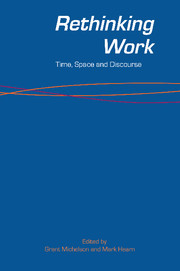Book contents
- Frontmatter
- Contents
- Tables and Figure
- Contributors
- Editorial Statement
- Abbreviations
- 1 Going to a New Place
- PART I TIME
- PART II SPACE
- 7 Union Power
- 8 Globalisation and Labour Mobility
- 9 A Spatial Perspective on International Work and Management
- 10 Markets and the Spatial Organisation of Work
- PART III DISCOURSE
- COMMENTARY
- Index
9 - A Spatial Perspective on International Work and Management
Illustrations from China
Published online by Cambridge University Press: 05 June 2012
- Frontmatter
- Contents
- Tables and Figure
- Contributors
- Editorial Statement
- Abbreviations
- 1 Going to a New Place
- PART I TIME
- PART II SPACE
- 7 Union Power
- 8 Globalisation and Labour Mobility
- 9 A Spatial Perspective on International Work and Management
- 10 Markets and the Spatial Organisation of Work
- PART III DISCOURSE
- COMMENTARY
- Index
Summary
In the current era of global capitalism, the internationalisation of organisations is a spatial and geographical activity, although this phenomenon is seldom acknowledged in the human resource management, industrial relations or management literatures. Over the past decade, however, there has been growing interest across the social sciences and humanities in space and geographical matters. A similar tendency is emerging in scholarship concerning work and labour, witnessed by single papers and chapters plus a growing number of edited collections (Economic and Industrial Democracy 2005 special issue; Labour and Industry 2002 special issue; Rainnie & Grobbelear 2005).
Geography is not an ‘optional extra’ but is integral to, ‘an active element’ in, all social life and activity. This chapter seeks to highlight the role of ‘space’ in the social activity of work. Specifically, it focuses on international aspects of work and management, drawing on China for illustrative purposes. It approaches this by providing a brief overview of three different approaches to the international study of work and management (cross-cultural, international HRM and comparative studies), drawn largely from existing literature as well as the author's primary research. It identifies the nature and contribution of each approach, outlines the manner in which ‘space’ is handled in that body of literature, and provides a brief critique of this. Discussion then shifts to the application of geographical concepts from economic or labour geography and the insights that these hold for studies of international work and management.
Information
- Type
- Chapter
- Information
- Rethinking WorkTime, Space and Discourse, pp. 165 - 186Publisher: Cambridge University PressPrint publication year: 2006
Accessibility standard: Unknown
Why this information is here
This section outlines the accessibility features of this content - including support for screen readers, full keyboard navigation and high-contrast display options. This may not be relevant for you.Accessibility Information
- 2
- Cited by
